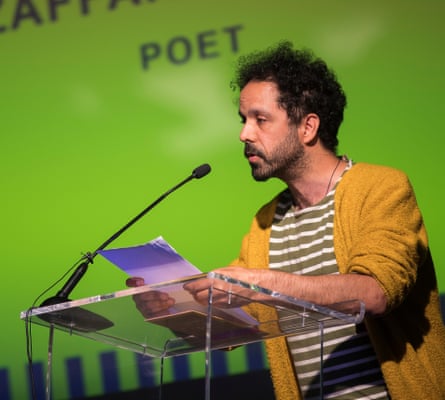A sequence of sonnets written during the first 200 days of Donald Trump’s presidency is just one of the “intensely political” poetry collections shortlisted for the most valuable award in British poetry, the £25,000 TS Eliot prize.
American Sonnets for My Past and Future Assassin, in which the award-winning US poet Terrance Hayes tackles the fast-moving news cycle of American politics, is one of 10 collections contending for the award. Alongside it, US poet laureate Tracy K Smith considers the country’s past in Wade in the Water, named after a spiritual sung on the Underground Railroad, former winner Sean O’Brien considers England’s relationship with its continental neighbours in Europa, and Nick Laird takes on topics from Grenfell Tower to the refugee crisis in Feel Free.
Judge and poet Clare Pollard said: “It’s an intensely political list, and right now it needs to be a political list. Poetry’s ability to engage with language when it is being so debased, when there are so many lies and so much fake news, its ability to look at the discourses around us, is so important.” She is joined on the judging panel by fellow poets Sinéad Morrissey and Daljit Nagra.
Hayes, who wrote a poem a day in the opening stretch of Trump’s presidency, said his sonnets were “a response to what it means to be a writer, an African American, a man, an American”.
He added: “It was the only way for me to process the quickness of the turnover of the media cycle that Trump has created – every day there is a new bone in the pot, so to speak. To cope with that I decided not to linger, so whatever happened on Monday I couldn’t be revising on Tuesday or Wednesday, because there would be another new shock to respond to. I don’t think of them as perfect sonnets by any measure, they’re almost a record of what was happening. I was putting in about 12 hours a day on them, working sunup to sunrise.”
Five first collections also made the cut, selected from a record 176 submissions, in what Pollard said was an astonishing year for debuts.

Zaffar Kunial, who was born in Birmingham to an English mother and a Kashmiri father, takes on topics including the different worlds his parents come from in his debut, Us. “My mum is white and English and was a primary school teacher. She could quote Shakespeare,” he said. “My dad wasn’t educated beyond the age of seven, his school was bombed from a British plane by the Indian air force during the war of independence. There were all sorts of differences between them, and that’s one kind of ‘us’ I look at.”
Kunial himself never studied literature, only reading his first novel, Hanif Kureishi’s The Buddha of Suburbia, at the age of 19. “I actually quote the first line: ‘My name is Karim Amir, and I am an Englishman born and bred, almost.’ I say in the book that English literature had me at ‘almost’,” he said. “I didn’t think literature was really for me until then.”
Kunial did not study writing either, although he worked as a creative writer for five years at Hallmark Cards. “I was mainly rhyming ‘do / to / you’ and ‘way / day / say’, but it gave me a hunger for language that was about real things such as love and death and parents, but that wasn’t doggerel,” he said, adding that the way he writes now couldn’t be more different.
Fiona Moore’s first collection, The Distal Point, opens with a series of elegies for her late partner, who died 11 years ago. Moore left her career in the Foreign Office to write poetry because, she said, of a question he had asked her. “I’d always written a bit of poetry,” Moore explained, “but I was writing about one poem every three years. Then I had a road to Damascus moment.” On a walk in Suffolk one evening, they got lost, and she was complaining about work. “He turned to me and said: ‘What will you regret not having done when you’re 60?’ And the answer came out: ‘Writing poetry.’” On the Monday, she asked for a sabbatical from her job, and then took voluntary redundancy. “The shortlisting is a validation, by three writers whose work I admire,” she said.
Also in the running for the award, which has been won in the past by poets including Ted Hughes, Alice Oswald and Carol Ann Duffy, are Ailbhe Darcy, Phoebe Power, Richard Scott and Hannah Sullivan. “Together they offer an invigorated language, confident mastery of form, and fresh, sophisticated perspectives on our uncertain times,” said Morrissey. The winner will be announced on 14 January.
The 2018 TS Eliot prize shortlist
Insistence by Ailbhe Darcy (Bloodaxe)
American Sonnets for My Past and Future Assassins by Terrance Hayes (Penguin)
Us by Zaffar Kunial (Faber & Faber)
Feel Free by Nick Laird (Faber & Faber)
The Distal Point by Fiona Moore (Happenstance)
Europa by Sean O’Brien (Picador)
Shrines of Upper Austria by Phoebe Power (Carcanet)
Soho by Richard Scott (Faber & Faber)
Wade in the Water by Tracy K Smith (Penguin)
Three Poems by Hannah Sullivan (Faber & Faber)
